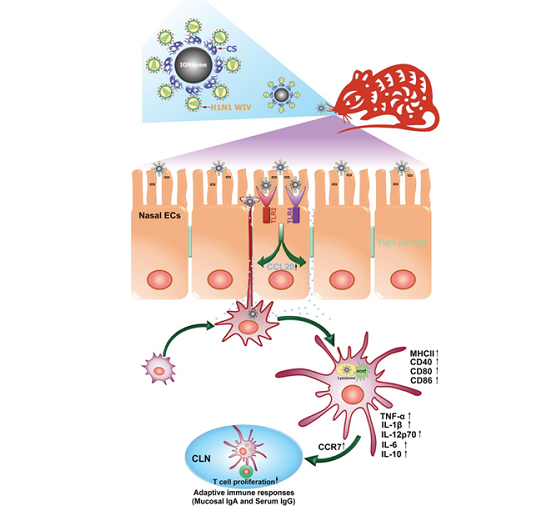Nanozyme acts as catalytic adjuvant to enhance mucosal vaccination for influenza protection
The journal of Advanced Science recently published the findings by the team of Dr. GAO Lizeng of the Institute of Biophysics (IBP) under the Chinese Academy of Sciences (CAS) and the CAS Engineering Laboratory of Nanozyme. The article, titled "Mucosal Vaccination for Influenza Protection Enhanced by Catalytic Immune‐Adjuvant", explains that nanozyme can be utilized as a catalytic adjuvant to enhance nasal mucosal immunity.
Influenza is an infectious respiratory disease caused by different strains of flu viruses, posing a great threat to human health and inflicting huge damages to social and economic growth across the world. The intramuscular injection of inactivated flu virus vaccines is a common strategy to prevent and control flu viruses. However, it is difficult for the commonly used method to initiate SIgA mucosal antibodies in mucosal regions and effectively prevent the invasion and spread of viruses. As the nasal cavity is the primary entry site of influenza viruses, viral infection can be detected and prevented as early as possible when mucosal immunity is well established in nasal cavity and upper respiratory tract. The key question now is that it is very hard for flu virus vaccines to break through mucosal barriers and activate effective immune response in nasal mucosa.
With a focus on the catalytic properties of Iron oxide nanozyme (IONzyme), researchers came up a new strategy of catalytic immune adjuvants to better resolve the question. IONzyme was discovered by GAO in 2007 when he was still a member of the team of Professor YAN Xiyun also of the IBP. Back then, he found that IONzyme was a classical nanozyme whose enzyme activity was similar to peroxides. The team of Professor YAN has focused their academic studies on IONzyme in terms of its design, catalytic mechanism and bio-medicine application for many years. It has expanded its research scope to in-vitro diagnosis, tumor diagnosis and treatment, anti-bacteria and anti-virus efforts. Based on previous research, researchers with GAO held a new argument that nanozyme can function as a catalytic adjuvant to enhance nasal mucosal immunity because it can break through mucosal barriers, modulate the properties of reactive oxygen species (ROS) and trigger high-level mucosal immune response in a move to ensure an efficient delivery of inactivated flu virus vaccines and achieve anticipated results of vaccine immunization respectively.
Researchers conducted modification of chitosan (CT) in a certain proportion on the surface of IONzyme to further boost catalytic activity and present positive charges to the surface of nanozyme. The modified nanozyme will combine with flu virus particles loaded with negative charges to produce the composites of nanozyme and inactivated flu virus, which are expected to live in epithelial nasal equipped with negative charges and promote the delivery of vaccines to mucosal targets. In addition, they found that nanozyme can activate receptor (TLR) 2/4 pathway in nasal epithelial cells and induce CCL20 secretion to recruit more dendritic cells (DCs) into the submucosal regions with the aim of collecting nasal flu antigens. Nanozyme will unleash the enzyme activity of peroxides at the acidic lysosomes, enhance the level of ROS, promote DC maturation, and activate natural immune response in the downstream after artificial composites are captured by DC cells. Meanwhile, DC cells will quickly migrate to draining lymph nodes and draining cervical lymph nodes, present modified flu antigens to T lymphocytes, and activate high-level IgA mucosal immune response and IgG systematic immune response. According to animal immunity and immunity challenge tests, the CS‐IONzyme‐H1N1 whole inactivated virus complex vaccine will provide a 100% protective immunity against influenza viruses with a lethal attack when experimental mice are given intranasal immunization twice. Therefore, IONzyme can be used as an alternative adjuvant to facilitate the research and development of novel mucosal vaccines because of its bio-stability, low cost and bio-safety.
The research was done by the IBP of the CAS and Yangzhou University. QIN Tao, a teacher at Yangzhou University, and MA Shang, a graduate student of the university, are co-first authors of the article. GAO Lizeng from the IBP, YIN Yinyan and PENG Daxin from Yangzhou University are correspondence authors of the article. It has received financial assistance from China's National Key R&D Programmes and National Natural Science Foundation.

Schematic of proposed mechanism for nanozyme acted as catalytic adjuvant to enhance antigen-specific immune response in nasal mucosa
(Image by Dr. GAO Lizeng's group)
Article link: https://doi.org/10.1002/advs.202000771
Contact: GAO Lizeng
Institute of Biophysics, Chinese Academy of Sciences
Beijing 100101, China
Email: gaolizeng@ibp.ac.cn
(Reported by Dr. GAO Lizeng's group)

